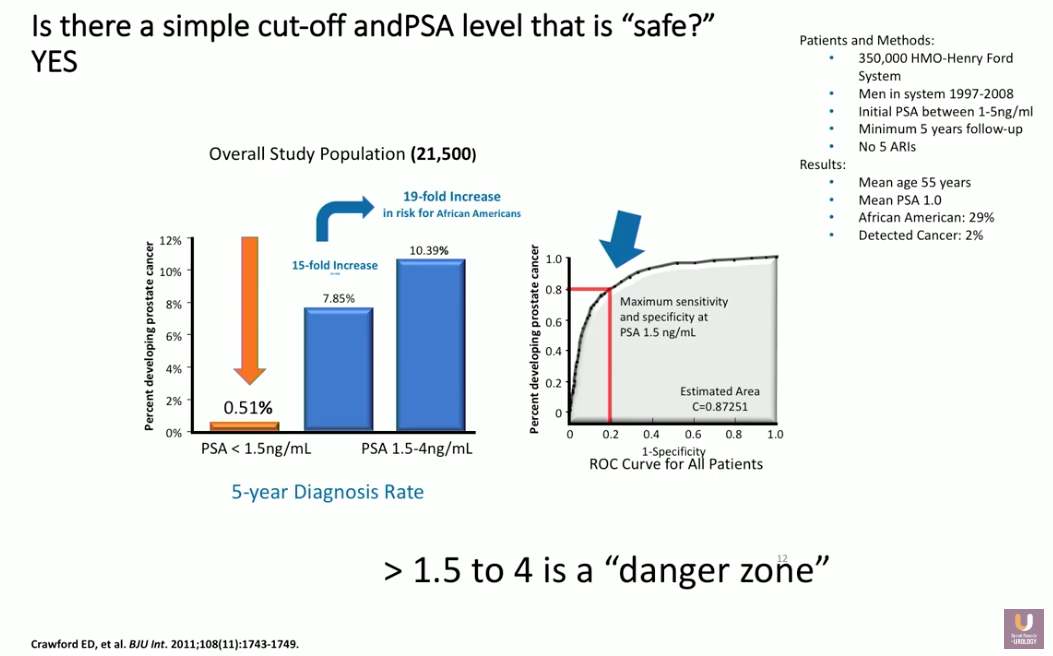E. David Crawford, MD, presented “The Use of Genomic Markers and Prostate Biopsy Decisions” during the 24th Annual Southwest Prostate Cancer Symposium on April 11, 2019 in Scottsdale, Arizona.
How to cite: Crawford, E. David. “The Use of Genomic Markers and Prostate Biopsy Decisions” April 11, 2019. Accessed Apr 2025. https://grandroundsinurology.com/the-use-of-genomic-markers-and-prostate-biopsy-decisions/
The Use of Genomic Markers and Prostate Biopsy Decisions- Summary:
E. David Crawford, MD, discusses the concept of disruptive technologies—developments which displace established technology or create entirely new industries—in the context of prostate cancer treatment and diagnosis. He reviews new and developing technologies transforming prostate cancer care, and discusses how they can be constructive as well as destructive.
Abstract:
In recent years, new innovations and discoveries have displaced or challenged many of the reigning technologies and techniques doctors use to diagnose and treat prostate cancer. While people often perceive progress as linear, these disruptive innovations can sometimes be more destructive than constructive. On the other hand, destructive innovations can become constructive once healthcare providers learn how to effectively use them.
For example, a breakthrough genetic marker, prostate-specific antigen (PSA), has transformed prostate cancer diagnosis. It is inexpensive, efficient, and leads to early detection.
However, PSA became destructive because of overdiagnosis leading to overtreatment. Confused messaging from urologists to family practice physicians contributed to the destructiveness of this diagnostic technique. Cohering to simple messaging regarding PSA cutoff levels could help these tests become constructive again.
Similarly, 30-year-old prostate biopsy technology is arguably destructive due to complications and disparity between biopsies performed and cancers found. However, the use of end-fire needles and 3D biopsy mapping could improve this technology.
This presentation discusses numerous other technologies that have disrupted, or may soon disrupt, the field of prostate cancer management. These include the ClariCore™ optical biopsy system, digital pathology technology, fusion imaging, multi-parametric MRI, micro-ultrasound, next-generation sequencing for infection identification, and new targeted focal therapies. As these technologies transform prostate cancer care, physicians should stay informed in order to use them constructively, rather than destructively.
About the Southwest Prostate Cancer Symposium
The Southwest Prostate Cancer Symposium (SPCS) is a multi-day conference that seeks to educate urologists, radiation oncologists, medical oncologists, and other healthcare professionals involved in the treatment of prostate cancer. The topics focus on current technical aspects of diagnosis and treatment of localized and advanced disease, particularly regarding imaging, technology, and training in the related devices. Dr. Crawford presented this lecture during the 24th SPCS in 2019. In 2020, the 25th SPCS will also offer training sessions involving imaging, scanning, and prostate cancer treatment related devices on site. Please visit this page in order to register for future SPCS meetings.
ABOUT THE AUTHOR
Researcher-physician E. David Crawford, MD, Jack A. Vickers Director of Prostate Research and Professor of Urology at the University of California, San Diego, has devoted his career in medicine to educating the public about men's health issues and finding effective techniques and procedures to address prostate cancer, the most common malignancy affecting men in the United States.


